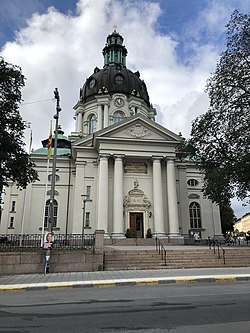Gustaf Vasa Church
| Gustaf Vasa Church | |
|---|---|
Gustaf Vasa kyrka | |
 Gustaf Vasa Church, main entrance facing Odenplan. | |
 | |
| 59°20′33″N 18°02′51″E / 59.34250°N 18.04750°E | |
| Location | Vasastaden, Stockholm |
| Country | Sweden |
| Denomination | Lutheran, Church of Sweden |
| Website | gustafvasa.nu |
| Architecture | |
| Architect(s) | Agi Lindegren |
| Style | Baroque Revival |
| Groundbreaking | 1901 |
| Completed | 10 June 1906 |
| Administration | |
| Diocese | Diocese of Stockholm |
| Parish | Gustaf Vasa Parish |
Gustaf Vasa Church (Swedish: Gustaf Vasa kyrka) is a church located in the Vasastaden district of Stockholm, Sweden. Inaugurated in 1906 and named after 16th century King Gustav Vasa, it was designed by architect Agi Lindegren in the Baroque Revival style. Situated between two busy avenues partially lined with trees, its dome rises 60 metres (200 ft) above the nearby Odenplan plaza. The floor plan is in the shape of a Greek cross and seats 1,200 people, making it one of the largest churches in Stockholm.[1][2]
Interior[edit]

The 15 metres (49 ft) high altarpiece was designed and built by Burchard Precht in his workshop between 1728 and 1731. It is Sweden's largest sculptural work in the Baroque style, originally created for the Uppsala Cathedral. Stored away at the Skansen museum for several years, it finally ended up at the Gustaf Vasa Church in 1906.[2][3]
The interior of the dome was painted by Viktor Andren, and features an interpretation of the Transfiguration of Jesus. The church also has several other frescoes done by the same artist, depicting the Four Evangelists, the Baptism, the Last Supper, the Gospel and the Decalogue.[2]
The church organ was built to the wishes of composer Otto Olsson, who was also the church organist 1907–1956. The organ has 76 voices spread over three manuals and pedals.[2] The crypt beneath the church was originally used as a burial chapel, and was expanded in 1924 with what is most likely Sweden's first columbarium.[1][2]
See also[edit]
References[edit]
- ^ a b "Bebyggelseregistret (BBR) - Riksantikvarieämbetet" (in Swedish). Swedish National Heritage Board. Retrieved 4 January 2015.
- ^ a b c d e "GUSTAF VASA FÖRSAMLING" (PDF). Church of Sweden. Retrieved 4 January 2015.
- ^ "The hidden stories of the baroque high altar in Gustaf Vasa church" (PDF). Stockholm: Disent. January 31, 2013. Retrieved 1 October 2013.
